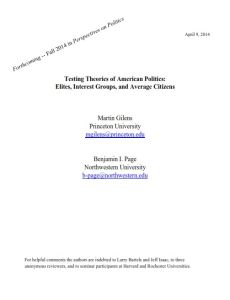Join getAbstract to access the summary!

Join getAbstract to access the summary!
Martin Gilens and Benjamin I. Page
Testing Theories of American Politics
Elites, Interest Groups, and Average Citizens
Princeton UP, 2014
What's inside?
If you think average Americans shape political policy, think again. See who really sets the agenda.
Recommendation
Many Americans may have long suspected that their ability to influence or even garner the attention of their elected representatives in Washington, DC, is limited. Now, this timely, innovative research report confirms their worst suspicions. Political scientists Martin Gilens and Benjamin I. Page used a unique data set to substantiate the conclusion that the policy-making process increasingly overlooks the interests of average US citizens to the benefit of affluent elites. getAbstract highly recommends this eye-opening presentation to civic-minded and politically astute observers who are concerned about the future of American democracy.
Summary
About the Authors
Martin Gilens is a professor of politics at Princeton University. Benjamin I. Page is a professor of policy research at Northwestern University.



















Comment on this summary